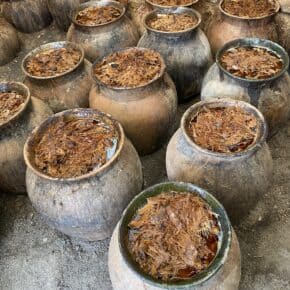What is mezcal artesanal?
What is mezcal artesanal? Mezcal artesanal is Spanish for artisanal mezcal. It is one of the three classes of mezcal established when the revised mezcal norm was ratified in 2017, after much controversy. The classes were created to help consumers distinguish between industrial mezcal and mezcal made by artisinal or “ancestral” processes.
What are the differences between ancestral and artisanal mezcal?
While ancestral mezcal producers must stick with strictly old-fashioned practices, producers of artisanal mezcal have slightly more options. For a complete run-down of ancestral processes, check out our encyclopedia entry on the topic.
Artisanal producers may bake their agave in traditional pit ovens but have the additional option of above-ground masonry ovens. They can mill their agave manually, by mallet or tahona, or employ mechanical shredders.
Both classes of mezcal require the exact same rules when it comes to fermentation. Producers may ferment in stone pits, holes in the ground, wooden or clay pots, brick tanks, hollow tree trunks, or animal hides. They may choose to include agave fiber in the fermentation tank.
Artisinal producers may use either pot or alembic stills, which may be made of copper or stainless steel. The norm’s wording is somewhat ambiguous, calling for distillation with “direct heat.” Although traditional stills are heated by wood fires, some palenques now use natural gas for continuous heat during distillation.
Note: Just because artisinal producers are allowed to use mechanical shredders or masonry ovens, it doesn’t mean they always do. Many producers use a mix of old-fashioned and slightly more modern processes and will explain this distinction on their labels. If you want to get deeper into this, check out How to read a mezcal label.












Leave a Comment